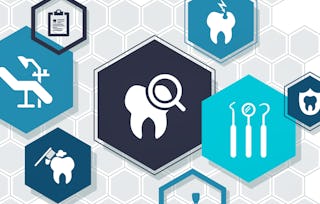Understanding the clinical terms and abbreviations commonly used during verbal or written communication in U.S. hospitals is challenging. This course is designed for U.S. health care profession students and for international students and practitioners who want to become more familiar with the language of the U.S. clinical setting. Others, such as caregivers and medical interpreters, who wish to develop a better understanding of terms and abbreviations used by health care providers will find this course helpful. The course provides visual and auditory learning experiences to enhance the understanding of terms and abbreviations commonly encountered on a general U.S. hospital unit. You need to pay the fee or apply for financial aid to access the course and earn a certificate. To find out more, click Learn more and apply next to the information about Financial Aid. (Use a computer, not a mobile device, for this step.)

Clinical Terminology for International and U.S. Students
Seize the savings! Get 40% off 3 months of Coursera Plus and full access to thousands of courses.

Clinical Terminology for International and U.S. Students

Instructor: Valerie Swigart, Ph.D. R.N.
136,468 already enrolled
3,233 reviews
Details to know
44 assignments
See how employees at top companies are mastering in-demand skills

There are 6 modules in this course
Instructor

Offered by
Explore more from Patient Care
 Status: Free Trial
Status: Free TrialRice University
 Status: Free Trial
Status: Free TrialUniversidades Anáhuac
 Status: Preview
Status: PreviewUniversity of Pittsburgh
 Status: Free Trial
Status: Free TrialRice University
Why people choose Coursera for their career

Felipe M.

Jennifer J.

Larry W.

Chaitanya A.
Learner reviews
- 5 stars
84.76%
- 4 stars
13.26%
- 3 stars
1.39%
- 2 stars
0.27%
- 1 star
0.30%
Showing 3 of 3233
Reviewed on May 22, 2023
I am very glad to get a chance to study for free here. thank you very much and do not worry it will help me a lot as a caregiver and in pursuing my study in nursing. Keep it up. Salute you all
Reviewed on Sep 18, 2021
As a beginner in Medical Terminology, this course was very useful in general comprehension of the clinical setting, and I already use my knowledge in my medical translation work. Thank you so much!
Reviewed on Oct 12, 2021
Hands down this course was nothing short than amazing! its helpful informative and it challenge you to want to go further into the medical field. every instructor was excellent.

Open new doors with Coursera Plus
Unlimited access to 10,000+ world-class courses, hands-on projects, and job-ready certificate programs - all included in your subscription
Advance your career with an online degree
Earn a degree from world-class universities - 100% online
Join over 3,400 global companies that choose Coursera for Business
Upskill your employees to excel in the digital economy

